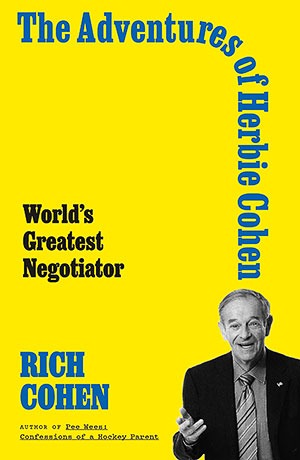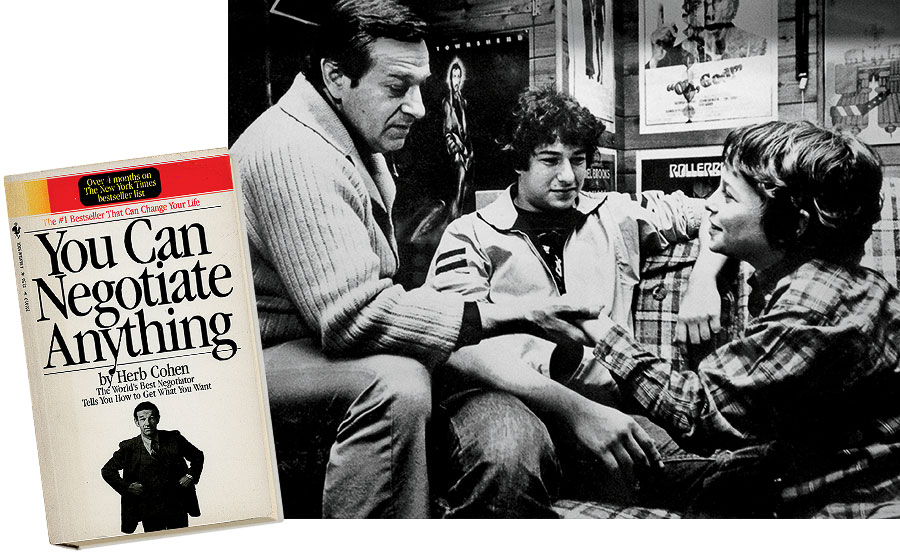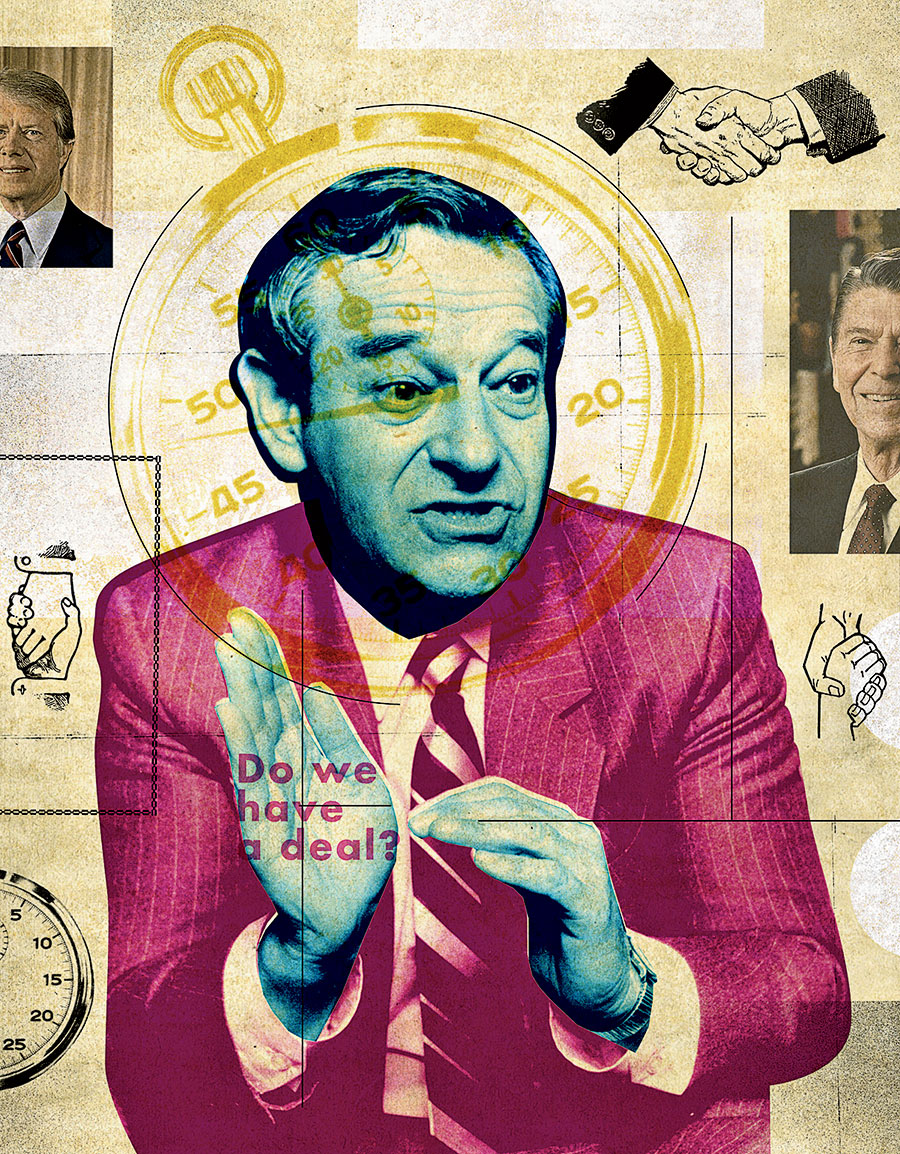In the mid-’70s, my parents started a business called Power Negotiations. My mom, Ellen, designed the logo: two men shaking hands, each with his thumb up. Win-win. This company sold a single product and derived its revenue from a single source: Herbie, my dad. Seminars, keynotes, negotiations. He described his mediation fee as “a minuscule percentage of an astronomical sum.” He did not like to speak at colleges, he said, because colleges gave an honorarium, which means “more honor, less arium.”

Ellen booked the jobs and the travel from a suite in the Ron of Japan building in Northbrook that overlooked the Edens Expressway and the Chicago Botanic Garden. The business grew by word of mouth. Herbie, who had climbed the ranks at Allstate before becoming a kind of hired gun, was soon putting on seminars for the FBI in Quantico, Virginia, where he taught conflict resolution and terrorist negotiation. He went on to advise the Departments of State and Justice, as well as the CIA. He helped design the FBI’s Behavioral Science Unit, famed for the elaborate personality profiles it uses to catch serial killers. In explaining the point of this work, he’d paraphrase Arthur Miller’s play The Price, saying, “You can’t know the price if you don’t know the player.” This had been his position since his childhood in Bensonhurst, Brooklyn, where he was constantly talking his way into parties and out of trouble: To reach a deal, you have to know what the other side needs, and to know that, you have to know who the other side is.
In 1980, he was brought to the White House to advise Jimmy Carter during the Iran hostage crisis. Herbie then went on TV and predicted the day and time the hostages would be released. He was off by just seven minutes. As much as anything, the accuracy of this prediction made his name. When asked how he’d done it, he explained his reasoning in terms that might be considered offensive today, which doesn’t make them less true.
For the Iranians, the hostages were like 52 Persian rugs put on a wall for sale, he said. And here comes the American Jimmy Carter. What’s the first thing he says when he gets into the bazaar? “I’m not leaving here without those rugs.” What just happened to the price? The Iranians made mistakes, too. If they wanted top dollar, they needed to close before the November election, their moment of maximum leverage. They missed it, and the price collapsed, at which point Herbie looked for the next deadline. January 20, 1981, Ronald Reagan’s Inauguration Day. The Iranians had been dealing with a peaceful Georgian who’d repeatedly said he had to have those rugs, but who’s coming up the road? Cowboy Dutch twirling his pistols and saying he might just blow up the market instead. “Once you had all that figured out, making the prediction was easy,” Herbie said later. “When will the hostages be released? Three minutes before Ronald Reagan takes office.”
Herbie met with the president-elect and suggested he make a tough statement on Iran to drive the hostage takers to deal with Carter. On December 28, 1980, when asked about the terms he might offer, Reagan said, “I don’t think you pay ransom for people that have been kidnapped by barbarians.” Herbie went on to advise several presidents, including Bill Clinton, and Reagan put him on the team that negotiated nuclear arms reduction with Russia, later known as START.
In 1979, Herbie wrote everything he’d learned on yellow legal pads in our basement in Glencoe, a basement that flooded whenever it rained. That book, You Can Negotiate Anything, went on to sell over a million copies and is considered a business classic.
As his fame grew, so did the oddness and variety of the tasks he was asked to perform. The dramatist David Mamet sent Herbie a draft of Glengarry Glen Ross, his play about real estate salesmen. Does it ring true? Herbie loved the play and suggested a single change: second prize in the sales contest should be a set of steak knives. “Because that’s what you got if you won the claims adjuster race at Allstate in the 1960s,” Herbie explained. “First prize: steak knives. Second: You don’t get fired.”
But speeches and seminars remained the heart of his business. He ran one- and two-day sessions all over America, then all over the world. No matter the audience, his message was the same: Stay detached. Don’t become fixated on a particular outcome. Care but not that much. If you approach a negotiation as if it were a game, you’ll have more fun and be more successful. If you approach life as if it were a negotiation, you’ll care less, achieve more, and live longer.
There was a lot of setup necessary for a seminar. Packets had to be copied, collated, and handed out, notebooks and stacks of fake cash distributed; the latter were used in mock negotiations. My sister traveled with Herbie and worked for him on some of these trips. She complained that he made her carry his bags. Then it was my older brother’s turn. Then mine.
We’d fly from O’Hare to a flyspeck regional airport, then make our way via rental car across the Midwest, traveling from downtown building to suburban office park. Like a rock band on tour, he’d deliver the same show with slight variation — “Hello, Cleveland!” — in each city. His style was less management guru than borscht belt comic, strategy cut with laughter, the elixir hidden in a chocolate egg cream. I set up chairs and welcomed attendees, then stood off to the side as he wrote on a big flip board.
We were up each morning before 6. He’d yawn when he woke, hair wild, knees stiff. His feet hit the floor like hammers. He’d shave in the bathroom with the door open so he could hear the TV. He’d practice new material as we sat at the buffet, then continue as we drove to the next town. He wanted to surprise audiences, to wrong-foot the yokels as in basketball; they think you’re going this way, overcommit, then — whoosh! — you’re gone. “Buy a man a fish, you feed him for a night. Teach a man to fish, he’ll be dead in a year from mercury poisoning.”

I got to know his routines by heart. Not a dud in the bunch, though of course I had my favorites. Like his story about “history’s first negotiation,” which he’d say is chronicled in the Bible. “God wanted to wipe out the original twin cities, those desert meccas of sin, Sodom and Gomorrah. Abraham was opposed, but how do you negotiate with the Almighty? Talk about power differential! So what did Abraham do? Did he say, ‘God, what is wrong with you? You’re making a stupid mistake’? Of course not. He went with a humble, low-key approach. He says, ‘Hi, God. It’s me, Abraham. I was just thinking over your decision to destroy Sodom and Gomorrah. Another good decision, God. Right as usual. But then a thought popped into my head. What if I could come up with 50 good men amid all the evil people there? Do you think it’d be OK to kill 50 good men along with the wicked?’
“For sure God will at least respond to Abraham. How do we know that? Because you always get a response once you realize that no response is also a response. God says, ‘OK, Abraham. Find me 50 good men and I’ll spare those cities.’
“Now Abraham has God at the table talking. That’s most of the battle. From there, it’s just about setting the price.
“ ‘I hadn’t really done a count,’ Abraham adds. ‘What if I’m five good people short?’
“ ‘OK. Find me 45 good men in Sodom and Gomorrah. That’ll be enough.’
“ ‘You know, God, I was speaking figuratively. I was really just making a point. For all I know, there may only be 25 good men in Sodom and Gomorrah.’
“ ‘OK,’ says God. ‘Find me 25 and we have a deal.’
“Abraham got God all the way down to 10, which Abraham couldn’t in fact find, but that’s beside the point. The point is this: Abraham got a great price! And how did he do it? By using his weakness, by appealing to God’s strength.
“By ceding power, you gain power,” Herbie would explain. “What are the most powerful words in a negotiation? Are they ‘I’m an expert. I know better’? No. They’re ‘Who?’ ‘Huh?’ and ‘Wha?’ When it comes to negotiating, you’d be better off acting like you know less, not more. In some cases, dumb is smarter than smart, and inarticulate is better than articulate. You want to train yourself to say, ‘I don’t know’ … ‘You lost me’ … ‘Could you repeat that?’ The most powerful words in business are ‘I don’t understand. Help me.’ Divest yourself of preconceived notions, biases, prejudices. Ignorance, even if feigned, will produce curiosity, humility, open-mindedness, and the kind of innovative ideas that may bring people together.”
Being weak does not mean being powerless; that was his point. He’d tell audiences about a prisoner in solitary confinement who wants a cigarette. He asks the guard, and the guard, under the impression the prisoner is powerless, laughs and turns away. “But the situation looks different to the prisoner,” Herbie said. “He knows there is always another option if you’re willing to take risks. He asks again, now in a booming voice: ‘Can I please have a cigarette?’ This time, when the guard turns away, the prisoner says, ‘If I don’t get it, I’m going to bang my head against the wall until I’m bloody. When they ask who did it, I’m naming you. They won’t believe me, but think of all the hearings you’ll have to attend and all the reports you’ll have to fill out, as opposed to giving me one crummy cigarette.’ ”
Herbie’s method was as old as Aesop: He told stories, and each story had a moral. He taught tricks, too, methods to increase effectiveness. There was, for example, the Nibble: You go into a store, Brooks Brothers at Water Tower Place, say, pick a salesman, and make him show you everything on the rack. Then, just when he’s about to lose patience, you tell him that you’re ready to buy. After you’ve been fitted for a suit and are walking to the register, you say, “What kind of ties will you be throwing in?”
He talked about the art of purchasing big-box items, like refrigerators. Trick 1: Ask when it goes on sale. Everything is always just about to go on sale. You’ll get that price. Trick 2: Ask “What if?”: “What if I buy four refrigerators?” Trick 3: Point out a blemish on the floor model and ask for a discount. If there is no blemish, create one.
A master of telephone negotiation, he explained what to do when everything goes wrong on a call. “I’d never recommend hanging up on another person. That would be socially unacceptable. Hang up while you’re talking. How can you convincingly hang up on yourself? Simple. Say the equivalent of ‘Hey, I’m really glad you called. You know, I was just thinking about you yester —’ ” Click.
On the second day of a two-day seminar, he’d screen 12 Angry Men, because “12 Angry Men dramatizes every type of negotiation.” In the course of the movie, set in the deliberation room during a murder trial, nearly the entire jury is moved, at the instigation of a character played by Henry Fonda, from convict to acquit. Herbie broke down each scene, freezing the action at crucial moments to explain how the need of each juror is determined and met.
I sat through this lecture on many occasions, and though it came to bore me, I loved the way he closed the talk, no matter how many times I heard it. Henry Fonda is walking down the courthouse steps into the rain-soaked city. Another juror calls out, “Hey, what’s your name?”
“Davis,” says Fonda.
The men shake hands, smile at each other, then part.
“And that’s the big point, the message of this movie,” Herbie said. “The most important people in your life, the people who have an impact and change everything, you don’t even know their names.”
I loved it because, one, it struck me as profound and, two, that’s my old man in a nutshell. To him, every good song, movie, or book is never about what it’s about, which might be a deathly ill baseball player, or a shut-in with a prized collection of figurines, or a salesman who’s gone off his rocker. It’s about life. If it’s beautiful, if it moves him, it’s about life. But that’s not how he phrased it. Here’s how he phrased it: “It’s not about a ballpark, you schmuck, it’s about everything.”
Here I speak specifically of his reaction to Frank Sinatra’s version of the Joe Raposo song “There Used to Be a Ballpark.” Every time we listened to it in the car, he’d tell me Sinatra improvised the last phrase — “the summer went so quickly this year”— which he considered the most important in the song, “because it’s not just the summer that goes so quickly; it’s life.”
He spent at least 300 days on the road most years. We used to flip through his calendar and laugh. If you can name a company, he probably lectured there: IBM, Sony, Atari, Apple, GM, Ford, Hilton, Hyatt, DuPont, Sikorsky, Honeywell, Microsoft, Google. The list goes on. Many clients sent thank-you gifts after a seminar. That’s how we got our bench press, our propane grill, our cotton candy machine. Sony sent copies of every record they had in the pipeline; that’s how I first heard the Clash.
The CEO of a company that dealt in antique cars asked Ellen if Herbie had any hobbies. Ellen, unable to think of anything other than cigars, said, “He likes to exercise.”
When the treadmill arrived two weeks later, Herbie was appalled.
“What was I supposed to say?” asked Ellen.
“Oh, I don’t know,” said Herbie. “How about antique cars?”



